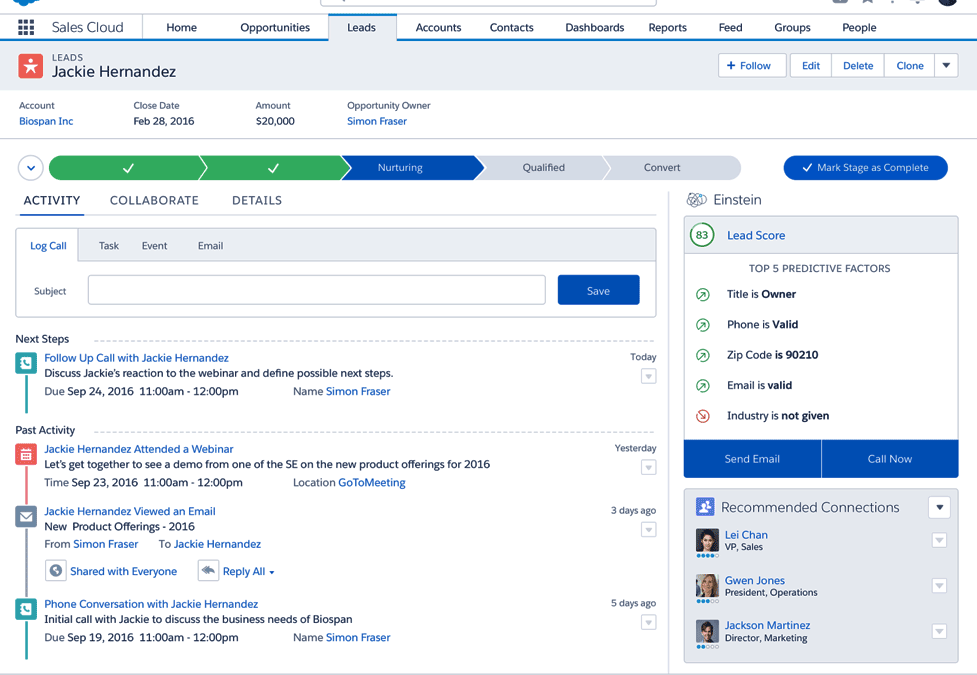When Gartner, one of the world’s leading IT research and advisory firms, released its 2016 emerging technology hype cycle, it identified three key trends. One of these, unsurprisingly, was all about smarter technology – machine learning, virtual assistants, natural-language question answering, etc.
While most people still associate these concepts with consumer products, from the successful to the unsuccessful, enterprise technology companies have also spent 2016 touting the power and potential of their artificial intelligence platforms.
A pair of major developer and partner conferences by Salesforce and Microsoft outlined how each company is planning to bring their own AI work to their respective business technology solutions. There’s still much we don’t know about each company’s offering, but their announcements have given us enough to compare the features they’ve included as well as the competing visions that they’re promising.
Before we do that, though, it’s worth discussing why companies like Salesforce and Microsoft are so invested in adding machine learning/AI to their CRM in the first place.
One quick note – most of these tech companies use the term artificial intelligence in a way that doesn’t exactly track with the general public conception of the term. While Siri, Cortana, Alexa and a few other products do embrace aspects of the talking, sentient, conversational personalities that science fiction has given us, the bulk of AI investment in the business technology space is subtler.
As Salesforce’s own training programs put it, “AI is about making your daily experiences smarter, by embedding predictive intelligence into your everyday apps.” So no, if you work inside Salesforce or Dynamics you won’t be able to get away with telling a digital assistant to put together your reports and tie off your sales for you, but hopefully you’ll be able to get your work done more efficiently and effectively.
This starts with data collection, where AI can help log information automatically for customer service, sales and marketing employees. By cataloging information about meetings, emails, calls and more touchpoints automatically, the system reduces the amount of work and time that individuals have to spend adding and adjusting data manually.
This leads to more effective data collection and more user adoption, as workers realize that they can spend more time executing and less time on data entry. More data also means that AI systems can use machine learning to become more effective, offering better outcomes.
The more exciting aspect of AI in CRM comes when the system takes advantage of the data to offer actionable suggestions. These can occur across the entire spectrum of CRM, from sales to marketing to customer service. One example is for AI to analyze the health of a salesperson’s relationships with their opportunities and contacts, based on historic purchase and interaction data as well as natural language processing. The system can then notify the salesperson when it becomes necessary to take action to preserve a relationship.
Other use cases for AI in CRM include:
- suggesting actions and email responses following specific interactions
- classifying and routing customer service cases through the appropriate script and recommending solutions
- delivering marketing materials to a contact at a time that maximizes the chance that they’ll engage with it
At the moment, the promise of AI in CRM is that it allows users to spend the majority of their time on revenue generating activities, rather than working to produce or make sense of data. In this way it also potentially mitigates the need for internal data science teams at most organizations, because effective AI implementation should include tools that allow developers to create their own apps with AI integration.
Given what we’ve covered, there’s something to be said for Oracle’s more measured approach to AI – that is, avoiding the term “artificial intelligence” entirely in favor of what they’re calling “Adaptive Intelligent Applications”. Still, it’s hard to blame companies like Salesforce and Microsoft for their more whole hearted embrace of the language of AI, given how emotionally engaging it is.
In our next post, we’ll go over the progress that Salesforce and Microsoft have made actually implementing their AI platforms into their CRM solutions, and how their plans for AI in CRM compare.
